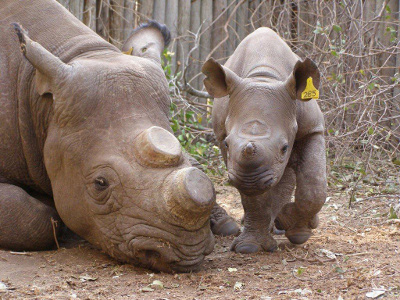
John Hume and Johan Kruger are attempting to overturn South Africa’s 2009 moratorium on the domestic trade in rhino horn, a measure put in place to stem burgeoning poaching numbers.
But with the rhino poaching epidemic only getting worse — 2014 saw a record 1,215 rhino killed for their horn — breeders say selling legally harvested horns could stifle the lucrative black market trade.
The two game breeders will try to convince the High Court in Pretoria that it is their constitutional right to sell rhino horn, what they describe as a renewable resource.
“A rhino in South Africa since the implementation of the moratorium is worth in money more dead than alive,” said Izak du Toit, a lawyer representing Hume, who owns over 1,000 rhino at his farm.
If judges rule in favour of the rhino farmers, it could pave the way for the Convention on International Trade in Endangered Species of Wild Fauna and Flora (CITES) to lift the global ban at a meeting in Johannesburg next year.
South Africa is home to around 20,000 rhino, or 80 percent of the world population.
The number of rhino killed has rocketed from 13 in 2007 to 1,215 last year.
The gentle grey giants are being slaughtered by poachers for their horn, which is used as a traditional medicine in East Asia.
The South African government said it wanted to keep the domestic ban in place.
“It is of the view that, at present, the moratorium constitutes a positive step toward the conservation of rhino,” it said in court documents.
Legally dehorning a rhino would see a farm owner put the animal under anaesthesia then saw off the horn, which is composed of keratin, the same material as fingernails.
Each horn would require its own permit that would be recorded in a database.
The case opened on Tuesday and arguments are set to continue through the week, before the judges to make a decision later this year.



